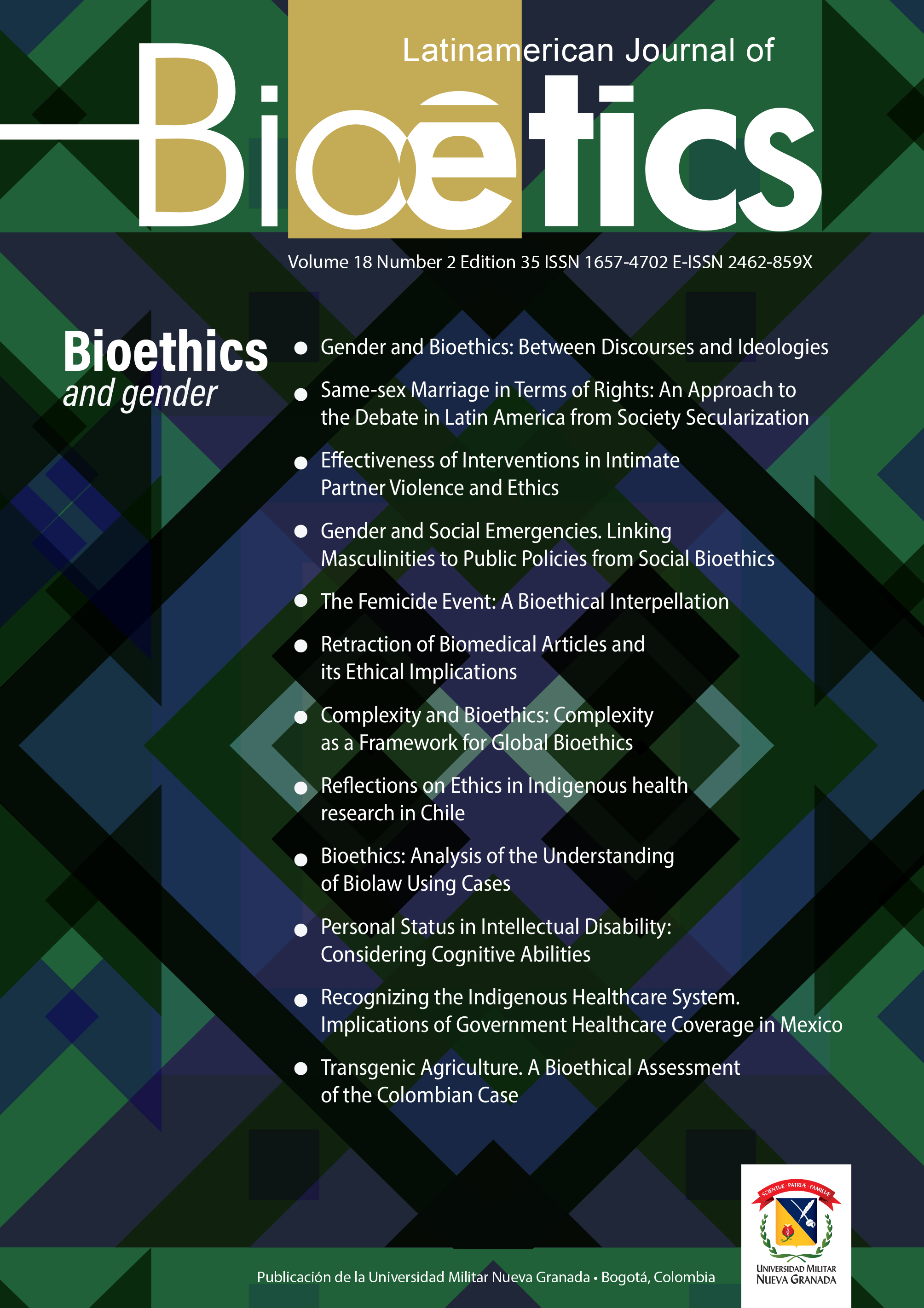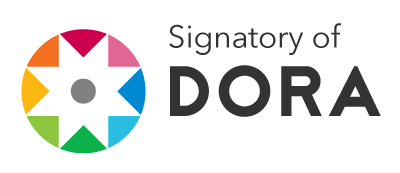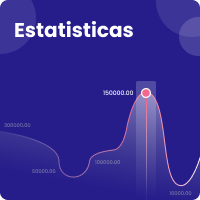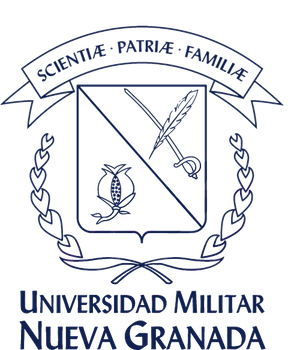Reflexões sobre a ética na pesquisa em saúde indígena no Chile
Resumo
O artigo busca refletir sobre a criação de uma infraestrutura de pesquisa ética mais sólida em relação à pesquisa em saúde indígena no Chile. Apresenta-se um âmbito de pesquisa ética que visa corroborar um relacionamento mais justo e colaborativo entre a academia e as comunidades indígenas, o que pode resultar em estudos mais relevantes e no aumento dos benefícios para as comunidades, de acordo com os princípios bioéticos da pesquisa. Usamos experiências internacionais para indicar como a infraestrutura da pesquisa em saúde indígena poderia ser estabelecida no contexto chileno. Em seguida, apresentamos o desenvolvimento e adoção de diretrizes para a pesquisa ética em saúde indígena e a orientação em direção a uma pesquisa colaborativa e à comunidade como mecanismos que podem ajudar a alcançar esses objetivos.
Downloads
##plugins.generic.ArticleMetadataByBiteca.languages##:
esReferências
Australian Institute of Aboriginal and Torres Strait Islander Studies, & The Lowitja Institute. (2013). Researching the right way: Aboriginal and Torres Strait Islander health research ethics: A domestic and international review. Retrieved from Canberra, Australia: MISSING INFO.
Australian Institute of Aboriginal and Torres Strait Islander Studies, & The Lowitja Institute. (2014). Evaluation of the National Health and Medical Research Council documents: Guidelines for ethical conduct in Aboriginal and Torres Strait Islander health research 2004 (Values and Ethics) and Keeping research on track: A guide for Aboriginal and Torres Strait Islander peoples about health research ethics 2005 (Keeping research on track). Retrieved from Canberra, Australia: MISSING INFO.
Ball, J., & Janyst, P. (2008). Enacting research ethics in partnerships with indigenous communities in Canada: "Do it in a good way". Journal of Empirical Research on Human Research Ethics: JERHRE, 3 (2), 33-51. https://doi.org/10.1525/jer.2008.3.2.33
Beauchamp, T. L., & Childress, J. F. (2013). Principles of biomedical ethics (7th ed.). New York: Oxford University Press.
Bharadwaj, L. (2014). A framework for building research partnerships with First Nations communities. Environmental Health Insights, 8, 15-25. https://doi.org/10.4137/EHI.S10869
Brady, M. (1995). Culture in treatment, culture as treatment-A critical appraisal of development in addictions programs for Indigenous North Americans and Australia. Social Science & Medicine, 41(11), 1487-1498. https://doi.org/10.1016/0277-9536(95)00055-C
Brunger, F., & Wall, D. (2016). "What do they really mean by partnerships?" Questioning the unquestionable good in ethics guidelines promoting community engagement in Indigenous health research. Qualitative Health Research, 26(13), 1862-1877. https://doi.org/10.1177/1049732316649158
Carrese, J. A., & Rhodes, L. A. (1995). Western bioethics on the Navajo reservation. Benefit or harm? JAMA, 274(10), 826-829. https://doi.org/10.1001/jama.1995.03530100066036
Cervini, E. (2011, 13 September). A theory out of the darkness. The Sydney Morning Herald. Retrieved from: http://www.smh.com.au/national/education/a-theory-out-of-the-darkness-20110912-1k5r6.html
Chandler, M. J., & Lalonde, C. E. (2009). Cultural continuity as a moderator of suicide risk among Canada's First Nations. Vancouver: Univ British Columbia Press.
Comisión Nacional de Investigación Científica y Tecnológica. (2014). Participantes de investigación científica en situatción de vulnerabilidad: Desafíos y resguardos especiales. 9o Taller de Bioética organizado por Comité Asesor de Bioética FONDECYT de CONICYT. Retrieved from Santiago, Chile: MISSING INFO.
Commonwealth of Australia. (2013). National Aboriginal and Torres Strait Islander Health Plan 2013-2023. Retrieved from: http://www.health.gov.au/internet/main/publishing.nsf/content/B92E980680486C3BCA257BF0001BAF01/$File/health-plan.pdf
Comunidad de Historia Mapuche. (2013). Comunidad de Historia Mapuche ante el Fondo de Investigación Avanzada en Áreas Prioritarias (FONDAP). Retrieved from: http://www.mapuche.info/print.php?pagina=4051
Couzos, S., Lea, T., Murray, R., & Culbong, M. (2005). 'We are not just participants - We are in charge': The NACCHO ear trial and the process for Aboriginal community-controlled health research. Ethnicity & Health, 10(2), 91-111. https://doi.org/10.1080/13557850500071038
Danto, D., & Walsh, R. (2017). Mental health perceptions and practices of a Cree community in Northern Ontario: A qualitative study. International Journal of Mental Health and Addiction, 15(4), 725-737. https://doi.org/10.1007/s11469-017-9791-6
Dobbin, M. (2015, 30 November). Heart of darkness: Melbourne University's racist professors. The Age. Retrieved from: http://www.theage.com.au/victoria/heart-of-darkness-melbourne-universitys-racist-professors-20151127-gl9whm.html
Dudgeon, P., Kelly, K., & Walker, R. (2010). Closing the gaps in and through Indigenous health research: Guidelines, processes and practices. Australian Aboriginal Studies, (2), 81-91.
Durie, M., Milroy, H., & Hunter, E. (2009). Mental health and the Indigenous peoples of Australia and New Zealand. In G. G. Valaskakis (Ed.), Healing Traditions: The Mental Health of Aboriginal Peoples in Canada (pp. 36-55). Vancouver: UBC Press.
First Nations Centre. (2003). Ethics Tool Kit: Information to share from the First Nations Centre of the National Aboriginal Health Organization. Retrieved from Ottawa, Canada: MISSING INFO.
First Nations Centre. (2005). Ownership, Control, Access, and Possession (OCAP) or self-determination applied to research: A critical analysis of contemporary First Nations research and some options for First Nations communities. Retrieved from: MISSING INFO.
First Nations Centre. (2007a). Considerations and templates for ethical research practices. Retrieved from Ottawa, Canada: MISSING INFO.
First Nations Centre. (2007b). OCAP: Ownership, control, access and possession. Retrieved from Ottawa, Canada: MISSING INFO.
Glass, K. C., & Kaufert, J. (2007). Research ethics review and Aboriginal community values: Can the two be reconciled?, 25. https://doi.org/10.1525/jer.2007.2.2.25
Grekul, J., Krahn, A., & Odynak, D. (2004). Sterilizing the "feeble-minded": Eugenics in Alberta, Canada, 1929-1972. Journal of Historical Sociology, 17(4), 358-384. https://doi.org/10.1111/j.1467-6443.2004.00237.x
Guillemin, M., & Gillam, L. (2004). Ethics, reflexivity, and "ethically important moments" in research. Qualitative Inquiry, 10(2), 261-280. https://doi.org/10.1177/1077800403262360
Harding, A., Harper, B., Stone, D., O'Neill, C., Berger, P., Harris, S., & Donatuto, J. (2012). Conducting research with tribal communities: Sovereignty, ethics, and data-sharing issues. Environmental Health Perspectives, 120(1), 6-10. https://doi.org/10.1289/ehp.1103904
Hedgecoe, A. M. (2004). Critical bioethics: Beyond the social science critique of applied ethics. Bioethics, 18(2), 120-143. https://doi.org/10.1111/j.1467-8519.2004.00385.x
Hudson, M., Milne, M., Reynolds, P., Russell, K., & Smith, B. (2010). Te Ara Tika: Guidelines for Māori research ethics: A framework for researchers and ethics committee members. Retrieved from Purnell, New Zealand: MISSING INFO.
Humphery, K. (2001). Dirty questions: Indigenous health and 'Western research'. Australian and New Zealand Journal of Public Health, 25(3), 197-202. https://doi.org/10.1111/j.1467-842X.2001.tb00563.x
Jamieson, L. M., Paradies, Y. C., Eades, S., Chong, A., Maple-Brown, L., Morris, P., . . . Brown, A. (2012). Ten principles relevant to health research among Indigenous Australian populations. Med. J. Aust., 197(1), 16-18. https://doi.org/10.5694/mja11.11642
Kerwin, D. W. (2011). When we become people with a history. International Journal of Inclusive Education, 15(2), 249-261. https://doi.org/10.1080/13603110902783373
King, M., Smith, A., & Gracey, M. (2009). Indigenous health part 2: the underlying causes of the health gap. The Lancet, 374(9683), 76-85. https://doi.org/10.1016/S0140-6736(09)60827-8
Kukkanen, R. (2006). From research as colonialism to reclaiming autonomy: Toward a research ethics framework in Sápmi. Retrieved from: MISSING INFO.
Kwaymullina, A. (2016). Research, ethics and Indigenous peoples: An Australian Indigenous perspective on three threshold considerations for respectful engagement. AlterNative, 12(4), 437-449. https://doi.org/10.20507/AlterNative.2016.12.4.8
León Correa, F. J. (2008). De los principios de la bioética clínica a una bioética social para Chile. Revista Medica De Chile, 136(8), 1078-1082. https://doi.org/10.4067/S0034-98872008000800018
León Correa, F. J. (2009). Bioética: Entre la universalidad y la interculturalidad. Los desafíos éticos de la globalización. Revista Medicina y Humanidades, 2.
Leyva Solano, X., Burguete, A., & Speed, S. (Eds.). (2008). Gobernar (en) la diversidad: Experiencias indígenas desde América Latina: Hacia la investigación de co-labor (1st ed.). México, D.F.: CIESAS; Quito: FLACSO Ecuador; Guatemala: FLACSO Guatemala.
Lolas Stepke, F. (Ed.) (2010). Bioética en América Latina: Una década de evolución: Centro Interdisciplinario de Estudios en Bioética - Universidad de Chile. MISSING INFO.
Menzies, C. R. (2004). Putting words into action: Negotiating collaborative research in Gitxaala. Canadian Journal of Native Education, 28(1/2), 15-32.
Ministerio de Salud. (2006). Sobre la investigación científica en el ser humano, su genoma, y prohibe la clonación humana. Santiago, Chile. MISSING INFO.
Ministerio de Salud. (2012). Ley No 20.584: Regla los derechos y deberes que tienen las personas en relación con acciones vinculadas a su atención en salud. Retrieved from: http://www.leychile.cl/Navegar?idNorma=1039348
Mohindra, K. (2016). Public health research and scheduled tribes: An ethical lens. Indian Journal of Public Health, 60(3), 221-223. https://doi.org/10.4103/0019-557X.189026
Mohindra, K. S. (2015). Research and the health of indigenous populations in low- and middle-income countries. Health Promotion International. https://doi.org/10.1093/heapro/dav106
Myser, C. (2003). Differences from somewhere: The normativity of whiteness in bioethics in the United States. American Journal of Bioethics, 3(2), 1-11. https://doi.org/10.1162/152651603766436072
Nahuelpán M, H. J. (2013). El lugar del "indio" en la investigación social: Reflexiones en torno a un debate político y epistémico aún pendiente. Rev. Austral. Sienc. Soc., 24, 71-91. https://doi.org/10.4206/rev.austral.cienc.soc.2013.n24-04
National Health and Medical Research Council. (2003). Values and ethics: Guidelines for ethical conduct in Aboriginal and Torres Strait Islander health research. Retrieved from Canberra, Australia: MISSING INFO.
Nicholls, R. (2009). Research and Indigenous participation: Critical reflexive methods. International Journal of Social Research Methodology, 12(2), 117-126. https://doi.org/10.1080/13645570902727698
Oyarzún, G. M., Pinto, C. M. E., Raineri, B. G. G., Amigo, H., Cifuentes, O., L., González, M. J., . . . Orellana, V. G. (2014). Experiencia del Comité de Ética de Investigación en Seres Humanos de la Facultad de Medicina de la Universidad de Chile y los desafíos que impone la nueva legislación chilena en la investigación médica. Revista Medica De Chile, 142, 889-895. https://doi.org/10.4067/S0034-98872014000700009
Pratt, B., & Loff, B. (2014). A framework to link international clinical research to the promotion of justice in global health. Bioethics, 28(8), 387-396. ttps://doi.org/10.1111/bioe.12009
Quilaqueo Rapimán, D., Quintriqueo Millán, S., Riquelme Mella, E. H., & Loncón Antileo, E. (2016). Educación Mapuche y educación escolar en la Araucanía: ¿Doble racionalidad educativa?. Cadernos de Pesquisa, 46(162), 1050-1070. https://doi.org/10.1590/198053143599
Silber, T. J. (1982). Bioethics--An interdisciplinary enterprise. Journal of Religion & Health, 21(1), 21-28. https://doi.org/10.1007/BF02273891
Stiegman, M. L., & Castleden, H. (2015). Leashes and lies: Navigating the colonial tensions of institutional ethics of research involving Indigenous peoples in Canada. International Indigenous Policy Journal, 6(3), 11. https://doi.org/10.18584/iipj.2015.6.3.2
The Centre of Research Excellence in Aboriginal Chronic Disease Knowledge Translation and Exchange. (2015). CREATE Critical Appraisal Tool. Retrieved from: http://create.joannabriggs.org/?page_id=1476
The National Commission for the Protection of Human Subjects of Biomedical and Behavioral Research. (1979). The Belmont report: Ethical Principles and Guidelines for the Protection of Human Subjects of Research. Retrieved from: MISSING INFO.
Tobias, J. K., Richmond, C. A. M., & Luginaah, I. (2013). Community-based participatory research (CBPR) with Indigenous communities: Producing respectful and reciprocal research. Journal of Empirical Research on Human Research Ethics, 8(2), 129-140. https://doi.org/10.1525/jer.2013.8.2.129
Tuhiwai Smith, L. (2012). Decolonizing methodologies: Research and Indigenous peoples. Retrieved from http://UNIMELB.eblib.com.au/patron/FullRecord.aspx?p=1426837
Tunón, H., Kvarnström, M., & Lerner, H. (Eds.). (2016). Ethical codes of conduct for research related to Indigenous peoples and local communities–core principles, challenges and opportunities. Ubmeje/Umeå, Sápmi and Sweden. Vaartoe – Centre for Sami Research: Umeå University.
Universidad de Chile. (YEAR). Comité de ética de investigación en seres humanos: Reglamento interno. Retrieved from Santiago, Chile: http://ceish.med.uchile.cl/ley/26.1.2015%20Reglamento%20Interno%20CEISH%20%282%29%20%281%29.pdf
Wexler, L. (2014). Looking across three generations of Alaska Natives to explore how culture fosters indigenous resilience. Transcultural Psychiatry, 51(1), 73-92. https://doi.org/10.1177/1363461513497417












